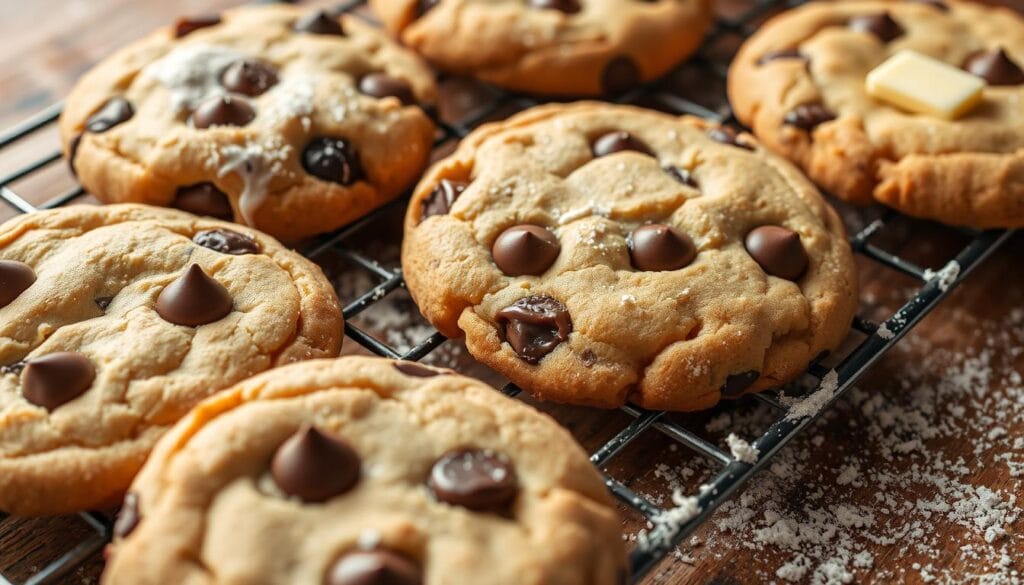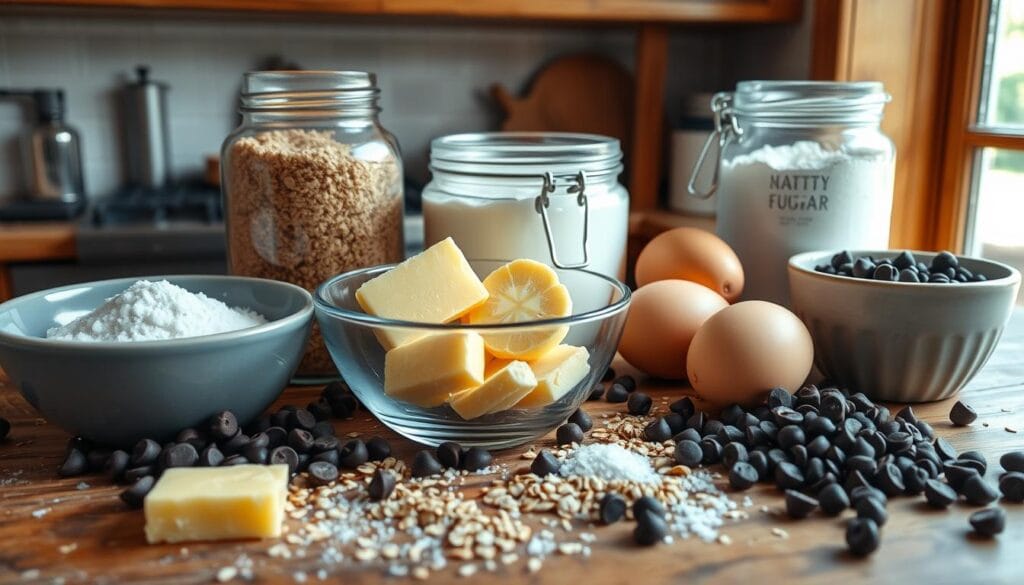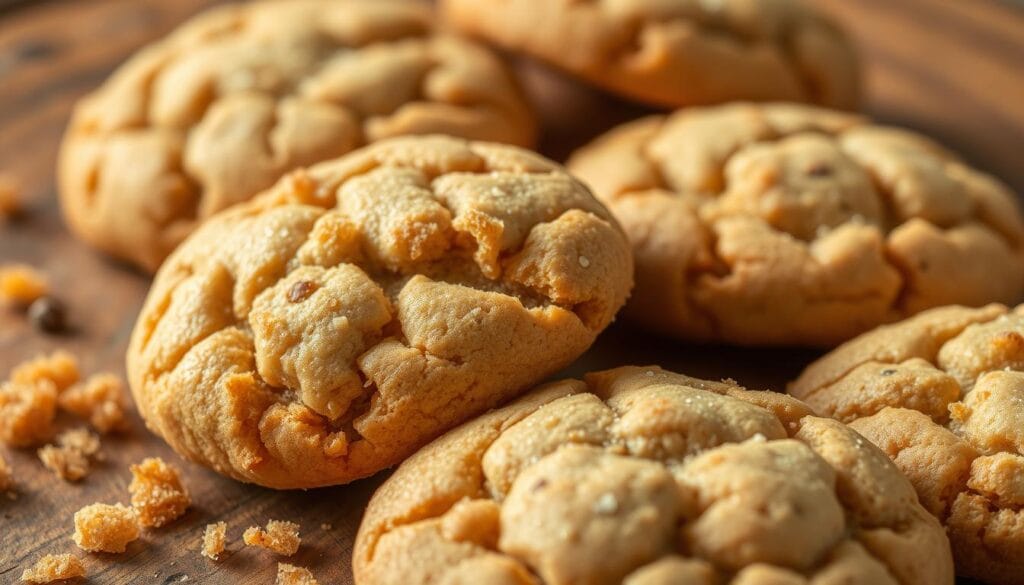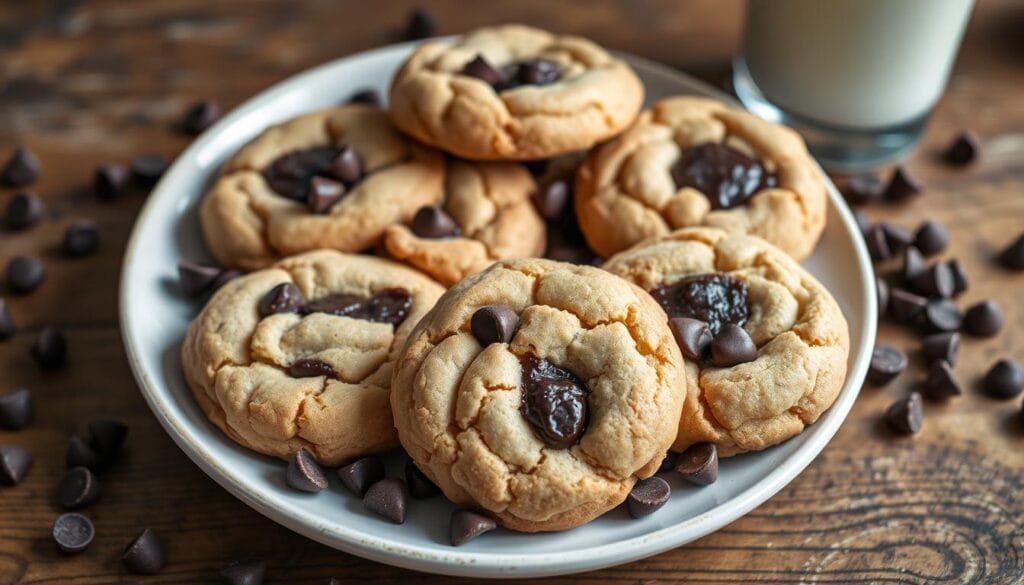I love cookies and always want them to be soft and chewy. I’ve tried many recipes and techniques. But, I found that corn syrup is the key to that perfect texture. What is the secret ingredient to keep cookies soft? For me, it’s corn syrup!
My grandmother’s chocolate chip cookies were famous. They were soft and chewy, making me want more. Years later, I learned her secret: corn syrup in the dough. This simple trick, along with the right sugars and baking, makes cookies stay soft.
Main Highlights
- Corn syrup is the secret ingredient for keeping cookies soft and chewy
- Brown sugar also plays a crucial role in retaining moisture and texture
- Proper storage in airtight containers and adding a slice of bread can help maintain softness
- Slightly underbaking cookies and using tall dough mounds contribute to a softer result
- Experimenting with different techniques and ingredients can help you achieve the perfect soft cookie
Understanding Texture in Cookies
The science of making soft, tasty cookies is cool. It mixes baking science, food chemistry, and culinary techniques. Knowing what makes cookies soft is key to getting them just right every time.
The Science Behind Cookie Softness
Brown sugar is a big reason why cookies are soft. It has glucose and fructose that pull in moisture. This keeps cookies from getting too dry and hard.
Factors Influencing Cookie Texture
- Ingredient ratios: Changing how much butter, sugar, and flour you use can change the cookie’s texture.
- Baking time and temperature: Baking them a bit less and at a lower temperature helps them stay soft.
- Storage methods: Keeping them in airtight containers and adding a slice of bread can stop them from getting hard.
| Technique | Impact on Cookie Texture |
|---|---|
| Using a 50/50 ratio of butter and shortening | Helps achieve the desired softness |
| Increasing brown sugar, decreasing white sugar | Contributes to a softer cookie texture |
| Creaming butter and sugar for 3-5 minutes | It prevents cookies becoming too fluffy or dense |
| Mixing dry ingredients gently | Prevents over-development of gluten for a tender texture |
| Chilling dough for at least 30 minutes | Helps produce thicker, softer cookies with improved flavor |

By learning about the science behind cookie softness and the factors influencing texture, bakers can make perfect soft-baked cookies every time.
Common Baking Ingredients That Affect Softness
Making the perfect soft and chewy cookies is an art. It’s all about knowing how common baking ingredients work. Each ingredient, from flour to fats, affects the cookie’s texture and how moist it stays.
Flour Choices and Their Impact
All-purpose flour is the top choice for cookies. It balances structure and softness well. Adding some whole wheat flour can make cookies chewier. Finding the right mix of all-purpose and whole wheat is key.
Sugar Varieties: More Than Just Sweetness
The sugar you pick can change how soft your cookies are. Brown sugar keeps cookies moist and chewy. White sugar makes cookies crisper and more structured.
The Role of Fats in Cookie Consistency
The fat in your cookies also matters. Butter adds great flavor. Shortening keeps cookies thick and soft, stopping them from spreading too much. Mixing these fats can lead to amazing results.
Knowing how baking ingredients work is crucial for soft, chewy cookies. By tweaking flour, sugar, and fat in your recipe, you can get the perfect cookie texture every time.

The Secret Ingredient Revealed
There’s a secret to soft, chewy cookies: corn syrup. It stays liquid at room temperature. This makes cookies crisp on the outside and soft on the inside.
Why Brown Sugar Works Wonders
Brown sugar is also key for soft cookies. It has molasses that keeps cookies moist. Adding a teaspoon of cornstarch to the dough makes cookies even softer.
The Importance of Moisture Retention
Keeping cookies moist is essential. Corn syrup and brown sugar help a lot. Learn how to keep your cookies soft and delicious with these tips. Try them out and see how your family and friends love them.

Soft, moist cookies need the right mix of ingredients and techniques. With some practice, you’ll make perfect cookies every time.
Tips for Keeping Cookies Soft After Baking
Getting the perfect soft and chewy cookie texture is not just about baking. To keep your soft cookie recipes, follow these baking hacks and cookie storage tips.
Proper Cooling Techniques
Don’t rush to cool cookies on a rack right after baking. Let them cool on the baking sheet for a bit. This helps them set without drying out. Then, move them to a wire rack to cool fully.
Storing Cookies for Longevity
- Keep cooled cookies in an airtight container or resealable bag. This keeps moisture in and prevents staleness.
- For extra moisture, add a slice of bread to the container with the cookies. The bread will add moisture, keeping it soft.
- Freeze-baked cookies for longer storage. Put them in a single layer on a baking sheet, then in a freezer-safe bag. Thaw at room temperature when you want to eat them.
By using these baking hacks and cookie storage tips, your soft cookie recipes will stay soft and fresh for days.

The Role of Baking Time and Temperature
Getting the perfect cookie texture is all about baking time and oven temperature. To keep your cookies soft and chewy, focus on these important details.
Optimal Baking Times for Soft Cookies
Bake your cookies at 350°F (175°C) for 10-12 minutes. They should be just set in the center. If you underbake them for 1-2 minutes, they’ll be softer and chewier.
Watch them closely. You want the centers to be slightly gooey when you take them out.
How Temperature Affects Results
The oven temperature greatly affects your cookies’ texture. Baking at 325°F (165°C) helps the edges stay soft. This way, the centers stay tender.
Adjust the baking time if you’re using a lower temperature. It might take a few more minutes.
It’s smart to use an oven thermometer. This ensures your oven is at the right temperature. Try small batches to find the best baking time and temperature for your cookies.
Experimenting with Additional Ingredients
Trying new ingredients can change your cookie game. There are special ingredients that can make your cookies even better. They can take your soft cookie recipes to the next level.
Adding Dairy for Extra Softness
Adding dairy like sour cream or cream can make cookies softer. These ingredients add moisture and fat. This makes the cookies tender and soft.
Light corn syrup also helps. It makes the cookies chewy and soft.
The Benefits of Using Pudding Mix
Instant pudding mix is another great secret. It makes cookies softer and tastier. The cornstarch in pudding keeps cookies moist. The extra dairy makes them richer and creamier.
Remember to adjust the liquid when using the pudding mix. This ensures the right consistency.
By trying these baking tricks, you can make amazing cookies. They will be soft and chewy. Your friends and family will love them.
Popular Cookie Recipes That Stay Soft
Cookie baking aims for a soft, chewy texture. Luckily, some classic recipes always hit the mark. They stay soft even days later. Let’s look at two favorites that will make everyone want more.
Chocolate Chip Cookies
The chocolate chip cookie is a favorite for many. It’s easy to make soft and gooey in the middle. The secret is using brown sugar, cornstarch, and a bit of honey or corn syrup.
To make these soft cookie recipes, start by creaming butter, white sugar, and brown sugar. Add vanilla and an egg. Then, mix dry ingredients with wet, and add chocolate chips. Chill the dough for 12 hours before baking at 350°F for 9-11 minutes.
Snickerdoodle Variations
Try different Snickerdoodle recipes for a twist. These cinnamon-sugar treats can be made soft and chewy like chocolate chip cookies. Add cornstarch, brown sugar, or pudding mix for that extra softness.
Whether you love chocolate chip cookies or snickerdoodles, these soft cookie recipes will please your sweet tooth. Happy baking!
Common Mistakes to Avoid
When baking soft, chewy cookies, it’s key to avoid common mistakes. Focus on proper dough handling and making sure all ingredients are included.
Overmixing Dough: A Recipe for Tough Cookies
It’s easy to overmix the dough, but overmixing makes cookies tough and dry. This happens because too much mixing develops gluten, making the cookies dense. Mix the ingredients just until they’re combined, without overworking the dough.
Skipping Key Ingredients
Don’t skip or substitute important ingredients like brown sugar or corn syrup. These add moisture and improve texture. Always stick to the recipe and don’t cut corners.
You’ll make perfect soft cookies by avoiding these baking tips and cookie mistakes. Pay attention to the baking science behind each ingredient and technique. Soon, you’ll be a cookie-making master.
Conclusion: The Perfect Cookie Awaits
We’ve learned how to make soft, chewy cookies. The secrets include using brown sugar and corn syrup. Also, storing cookies correctly and watching baking time and temperature are key.
But the best part is trying new things. Make your own special soft cookie recipes.
Recap of Key Takeaways
This article explained the science of cookie texture, including choosing the right ingredients and baking well. Now, you know how to bake soft, chewy cookies every time.
Encouragement to Experiment in the Kitchen
Now, it’s time to get creative in the kitchen. Try new flavors and adjust ingredients. Find the baking method you like best.
The world of soft cookie baking is yours. Enjoy trying new things. Find your own special soft cookie recipe that will make everyone happy.
FAQ
What is the secret ingredient to keep cookies soft?
Corn syrup is the secret to soft cookies. It adds moisture and flexibility, making them chewy.
How does the choice of sugar affect cookie texture?
Brown sugar makes cookies soft. Its glucose and fructose hold moisture, giving a chewy texture.
What storage methods help maintain cookie softness?
Store cookies in airtight containers with a slice of bread. This keeps them soft. Proper storage prevents drying out.
How does baking time and temperature impact cookie softness?
Bake cookies a bit less than the recipe says. Baking at 350°F for 10-12 minutes works best for soft cookies.
Can other ingredients be used to enhance cookie softness?
Yes, adding sour cream, light corn syrup, or pudding mix can make cookies softer. Try different ingredients for your own soft cookie recipe.
What are some common mistakes to avoid when baking soft cookies?
Avoid overmixing and skipping brown sugar or corn syrup. These mistakes make cookies tough. Stick to the recipe and don’t overbake.

